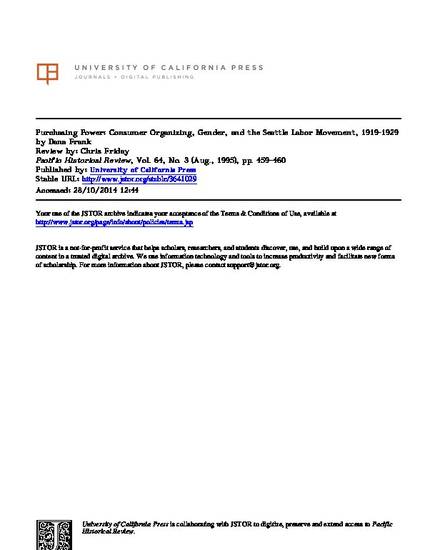
Article
Purchasing Power: Consumer Organizing, Gender and the Seattle Labor Movement, 1919-1929 – Book Review
Pacific Historical Review
Document Type
Book Review
Publication Date
8-1-1995
Disciplines
Abstract
Dana Frank argues that Seattle's working people rode an unprecedented wave of power and control from the World War I boom economy to the early 1920s. During that era, not only did Seattle trade unions give some grudging limited support to unionization among women, African Americans, and Japanese Americans, they also sought to create a political economy controlled by and for the working class. Leaders of the Seattle Central Labor Council attempted to wield the "purchasing power" of union members to carry out consumer boycotts against "unfair" retailers in the city, to establish worker "owned" cooperative enterprises such as grocery and dry goods stores, barbershops, laundries, and theaters.
DOI
10.2307/3641029
Subjects - Topical (LCSH)
Labor unions--Political activity--Washington (State)--Seattle--History--20th century; Labor movement--Political activity--Washington (State)--Seattle--History--20th century; Boycots--Washington (State)--Seattle--History--20th century
Subjects - Names (LCNAF)
Frank, Dana. Purchasing power
Geographic Coverage
Seattle (Wash.)--History--20th century
Genre/Form
reviews (documents)
Type
Text
Language
English
Format
application/pdf
Citation Information
Chris Friday. "Purchasing Power: Consumer Organizing, Gender and the Seattle Labor Movement, 1919-1929 – Book Review" Pacific Historical Review Vol. 64 Iss. 3 (1995) p. 459 - 460 Available at: http://works.bepress.com/chris_friday/3/
